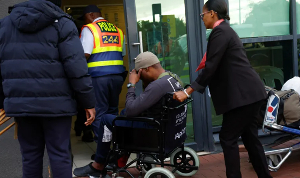Koforidua, Sept. 16, GNA- The Eastern Regional Minister, Mr. Yaw Barimah, has stressed the need for child advocates to strike a delicate balance between the needs relevant for the survival of the family and those of children when making representations on child labour. According to him, a "doctrinaire approach," being postulated by a section of the society that sought to label many tasks performed by minors as child labour was alien to the African cosmology, where "hard work is a respected value and children are expected to assist on farms to provide succour for the family."
Speaking at a forum on "Enhancing the survival, protection and development of the child" at Koforidua on Friday, Mr. Barimah said what was required with regard to the protection of the child from labour was to ascertain whether the work sacrifices the child's access to education and whether it was likely to have an effect on his health.
"What we should be concerned with is a system that does not sacrifice a child's need to education," said Mr Barimah who is also the Member of Parliament for New Juaben South.
He said it was an accepted norm that children do help their parents on farms and engaged in household chores as long as such undertakings do not interfere with the child's educational and other social needs, adding that this should not be misconstrued with child labour which involved engaging a child in a hazardous work.
Delving into his childhood, Mr. Barimah recalled assisting his parents on their cocoa farms during his school days, which did not interfere with his studies and therefore could not accept any "dogmatic approach" being adopted towards the issue of child labour in the country.
He described as a "misnomer", the impression that children assisting their parents by discharging household chores or working on the farms were necessarily being abused.
Speaking on child survival in the region, Dr Ebenezer Appiah-Denkyirah, Eastern Regional Director of Health Services, appealed to religious institutions to get more involved in child survival programmes such as monitoring pregnant congregants to ensure that they attend regular antenatal services.
He said without such concerted surveillance, the issue of child survival for under-five year children would continue to be bleak because only 20 per cent of births in the region were supervised by mid-wives. Mr Kofi Abinah, the Regional Population Officer, said his outfit was helping decentralized agencies invest more in young people as part of efforts to ensure sustainable reduction of poverty.
General News of Saturday, 16 September 2006
Source: GNA
Helping parents on farm is not child labour, Minister
Entertainment











